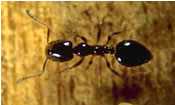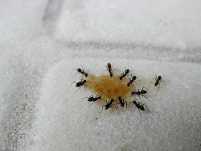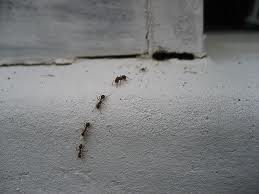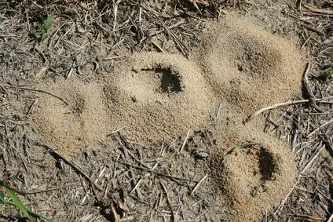Now that the month of May in South Jersey is acting like “April Showers Bring May Flowers” – our phones have been ringing to solve ant problems.
Most homeowners who encounter ant infestations often are frustrated, annoyed and irritated. Some are embarrassed, others are anxious and concerned.
In order to combat an ant invasion effectively you must first identify “which ant” it is.
 One of the most common ants in South Jersey homes is the Little Black Ant.
One of the most common ants in South Jersey homes is the Little Black Ant.
(Image Courtesy of National Pest Management Association)
 It is a tiny ant – 1/16th of an inch long, shiny and black, with 6 legs and elbowed antennae.
It is a tiny ant – 1/16th of an inch long, shiny and black, with 6 legs and elbowed antennae.
The Little Black Ant is active day and night and is often seen carrying particles of food long distances back to its nest.
Their colonies are very large – with thousands of workers and several queens.
Multiple queen colonies enable an ant colony to survive even after a catastrophic loss of worker ant if at least one and a few worker ants survive. Yet another reason over the counter pest sprays are not helping.
 Little Black Ants eat a wide variety of foods including sweets, meats and other insects – living or dead. Their natural food is honeydew – the sweet secretion of plant sucking insects such as aphids.
Little Black Ants eat a wide variety of foods including sweets, meats and other insects – living or dead. Their natural food is honeydew – the sweet secretion of plant sucking insects such as aphids.
 Little Black Ants are known as good “trailers” – when the forager ants find a food source, they release a pheromone that calls the workers to help cut up and cart the food particles back to the nest.
Little Black Ants are known as good “trailers” – when the forager ants find a food source, they release a pheromone that calls the workers to help cut up and cart the food particles back to the nest.
 Outdoors, Little Black Ants nests are found under tree bark, under rotting logs, in fence posts, in tree stumps, dead tree limbs, wood piles, beneath rocks, in lawns and in open areas of soil. They create very small craters of fine soil.
Outdoors, Little Black Ants nests are found under tree bark, under rotting logs, in fence posts, in tree stumps, dead tree limbs, wood piles, beneath rocks, in lawns and in open areas of soil. They create very small craters of fine soil.
Indoors they nest in woodwork, masonry, and under carpeting.
The workers are known to raise their abdomens and spray venom when threatened or alarmed. They can cause painful bites with swelling and inflammation.
They are also known to damage electric cables, clothes and fabrics.
What you can do to keep them out:
- Seal any cracks or crevices in exterior walls and around utility lines.
- Repair any damaged wood in windows, door frames, porches, and eaves.
- Clean up all leaf litter and debris.
- Store woodpiles away from the house or garage.
- Trim shrubs/trees away from the home.
- Reduce honeydew-producing insects such as aphids
- Eliminate any moisture problems.
What you can do if they are already in:
- Wipe up spills and crumbs immediately.
- Don’t leave open containers of sugars, honey, butter or snacks on countertops or tables.
- Leave pet food out only briefly.
- Clean and empty kitchen garbage cans frequently.
- Repair leaky faucets.
If your efforts to keep ants at bay are not working – we can help to minimize the problem as quickly as possible – Call AB-Con today and have your Little Black Ant problem solved correctly from the start!
